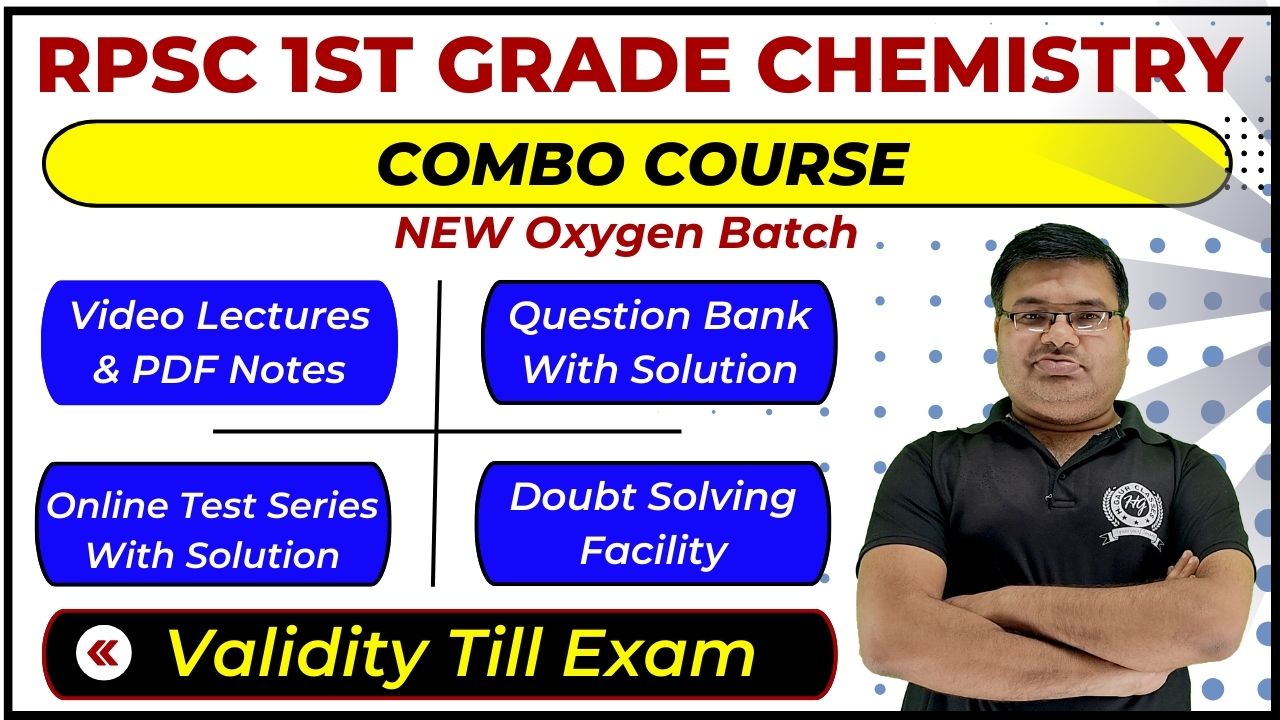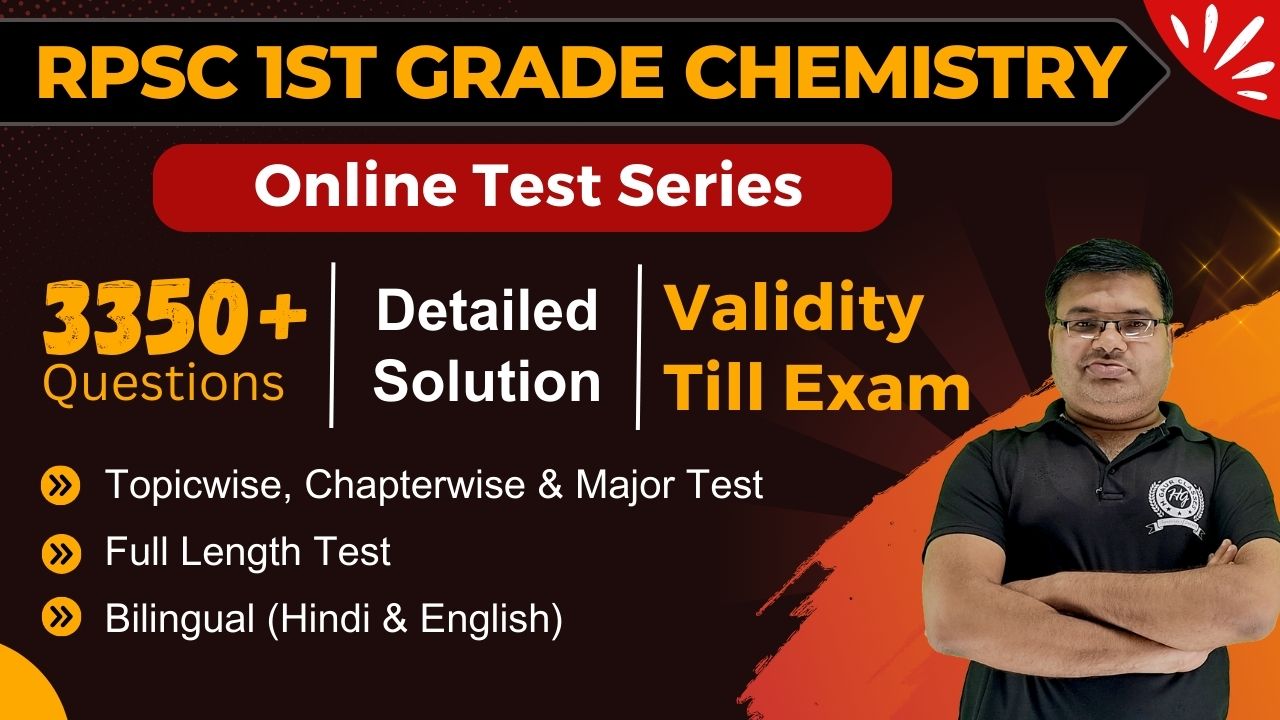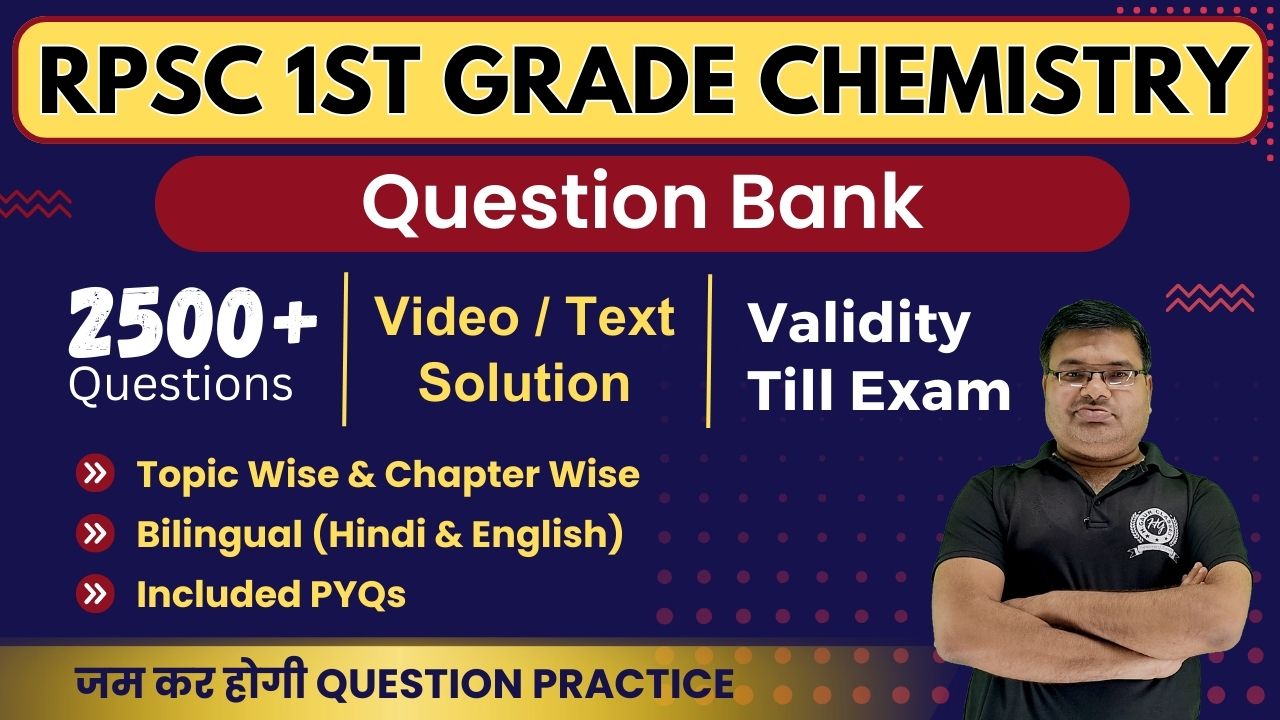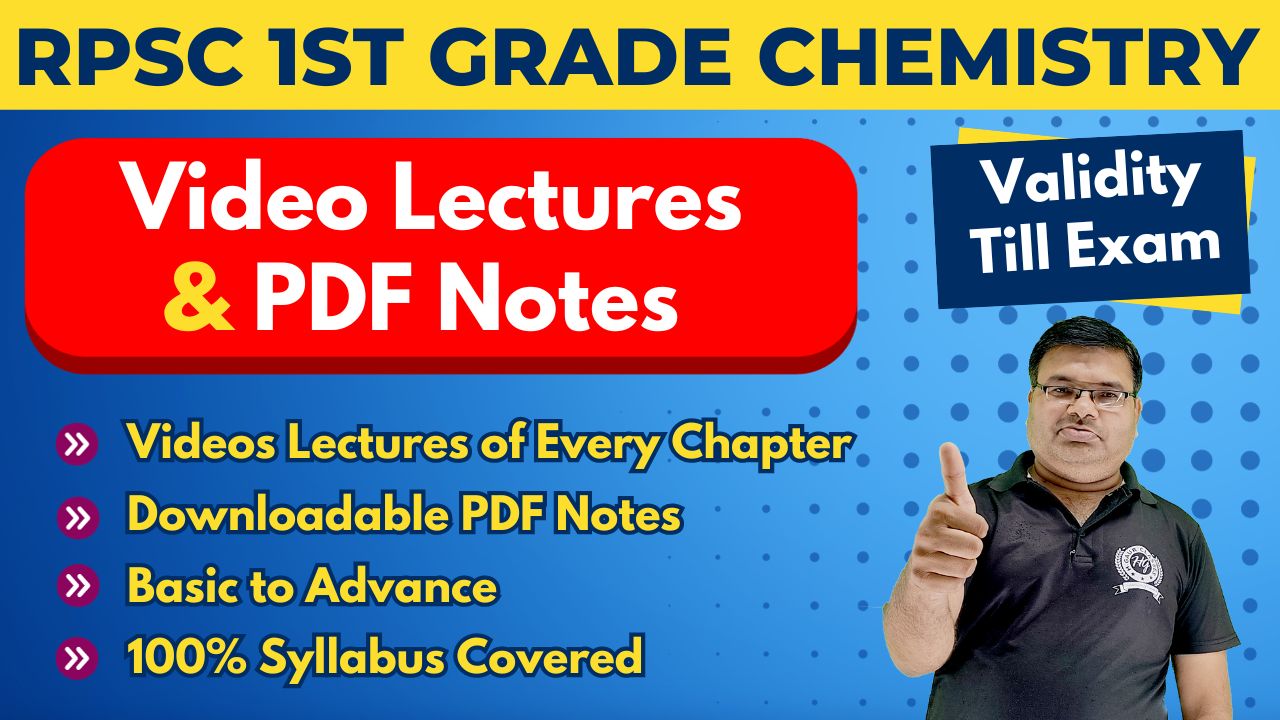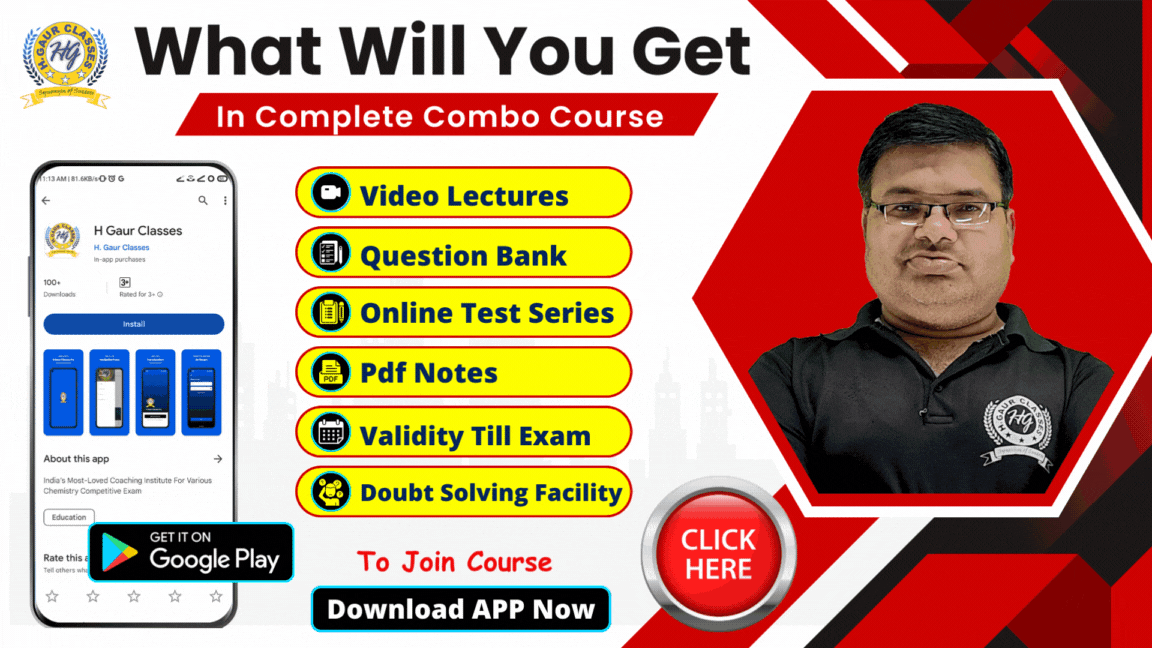Build Your Future As RPSC 1st Grade (PGT) Chemistry Teacher
We at H. Gaur Classes provides Online Courses for RPSC 1st Grade (PGT) Chemistry.
All the aspirants who wants to be a RPSC 1st Grade (PGT) teacher can either visit the center or download H Gaur Classes app to enroll for upcoming vacancies Online Course, so that students can learn all the concepts and prepare well for the selection on time.
We have produced remarkable results in past few years and proved our excellence. At present.
Select a Course To Get Detail
Time to Prepare for RPSC 1st Grade (PGT) Chemistry
H Gaur Classes is offering coaching for RPSC 1st Grade (PGT) Chemistry to help the students or aspirants to prepare for upcoming vacancies, so that they can start preparation on time. Admission for online New Batches is now open, and student can call us for more details or Click on Course Link Given Below. We assist the students to learn the concepts from basics to advance under the guidance for top experienced faculties.
Education Qualification
- Post Graduate or equivalent examination recognized by UGC in the relevant subject
- Degree or Diploma in Education recognized by the National Council of Teacher Education/Government.
Age Criteria
- Minimum 21 years and maximum 40 years as in 01 January 2023.
Age Relaxation Criteria
- 10 years for Male Candidates belonging to the Scheduled Castes, Scheduled Tribes, Backward Classes, More Backward Classes and Economically Weaker Sections of Rajasthan State
- 10 years for Women Candidates belonging to the Scheduled Castes, Scheduled Tribes, Backward Classes, More Backward Classes and Economically Weaker Sections of Rajasthan State
- 5 years for Women Candidates belonging to General Category
- No Age Limit - In the case of a widow, she will have to furnish a certificate of death of her husband from the Competent Authority and in case of divorcee, she will have to furnish proof of divorce.
- The upper age limit mentioned above shall not apply in the case of an ex-prisoner who had served under the Government on a substantive basis on any post before his/her conviction and was eligible for appointment under these Rules,
- The upper age limit mentioned above shall be relaxed by a period equal to the term of imprisonment served in the case of other ex-prisoners who was not over age before his conviction and was eligible for appointment under these Rules
- The upper age limit mentioned above shall be relaxed by a period equal to the service rendered in the N.C.C. in the case of Cadet Instructors, if the resultant age does not exceed the prescribed maximum age limit by more than three years, they shall be deemed to be within the prescribed age limit.
- The upper age limit for persons serving in connection with the affairs of the State, Panchayat Samities and Zila Parishads and in the State Public Sector Undertaking/Corporations in substantive capacity shall be 40 years.
- The Released Emergency Commissioned Officers and Short Service Commissioned Officers after release from the Army shall be deemed to be within the age limit even though they have crossed the age limit when they appear before the Commission, Board or Appointing Authority, as the case may be, had they been eligible as such at the time of their joining the Commission in the Army
- The persons appointed temporarily to a post in the Service shall be deemed to be within the age-limit, if they were within the age limit when they were initially appointed even though they have crossed the age-limit when they appear finally before the Commission/Board/Appointing Authority and shall be allowed up to two chances had they been eligible as such, at the time of their initial appointment;
- According to the Rajasthan Civil Services (Absorption of Ex-servicemen) Rules 1988, relaxation in upper age limit shall be ten years for Exservicemen; Provided that if permissible age after relaxation under this rule works out to be more than 50 years, then upper age limit of 50 years shall be applicable but in case of direct recruitment, where experience of lower post is essential, the maximum upper age limit of 55 years shall be applicable
- According to the Rajasthan Rights of Persons with Disabilities Rules 2018, the upper age limit mentioned above shall be relaxed by 05 years for persons with benchmarks disabilities.
Scheme and syllabus of competitive examination for the post of School Lecturer
- The examination shall carry 450 marks.
- There will be two papers. Paper I shall be of 150 marks and Paper II shall be of 300 marks. Duration of Paper I shall be One and a Half hours and the duration of Paper II shall be Three hours.
- All the questions in both the Papers shall be Multiple Choice Type questions.
- Negative marking shall be applicable in the evaluation of answers. For every wrong answer one-third of the marks prescribed for that particular question shall be deducted. Explanation:- Wrong answer shall mean an incorrect answer or multiple answers.
- The minimum qualifying marks for each paper shall be 40%. Provided that the percentage fixed as above shall be relaxed by 5% for the candidates belonging to the Scheduled Castes and Scheduled Tribes
- Subjects included in both the papers are shown in the table below
PAPER – I General Studies Duration: 1 Hour and 30 minutes
| S. No. | Subject |
| 1 | History of Rajasthan and Indian History with special emphasis on Indian National Movement |
| 2 | Mental Ability Test, Statistics (Secondary Level), Mathematics (Secondary Level), Language Ability Test :- Hindi, English |
| 3 | Current affairs |
| 4 | General Science, Indian Polity, Geography of Rajasthan |
| 5 | Educational Management, Educational Scenario in Rajasthan, Right of Children to free and Compulsory Education Act, 2009 |
PAPER – II Subject Concerned Duration: 3 Hour
| S. No. | Subject |
| 1 | Knowledge of Subject Concerned: Senior Secondary Level |
| 2 | Knowledge of Subject Concerned: Graduation Level |
| 3 | Knowledge of Subject Concerned: Post Graduation Level |
| 4 | Educational Psychology, Pedagogy, Teaching Learning Material, Use of Computers and Information Technology in Teaching Learning. |
SYLLABUS FOR EXAMINATION FOR THE POST OF LECTURER (SCHOOL EDUCATION) CHEMISTRY
Part – I Senior Secondary Level
- Atomic Structure: Fundamental Particles, Modern concept of atomic structure, Quantum numbers, Aufbau principle, Pauli’s exclusion principle, Hund’s Rules. Electronic configuration of elements, Classification of elements and periodicity in properties, s, p, d and f Block elements.
- p- Block Elements: General introduction, Electronic configuration, Occurrence, Oxidation states, Trends in physical and chemical properties.
- Transition Elements: Transition elements, Electronic configuration, Oxidation states, Absorption spectra including charge transfer spectra and magnetic properties, Co-ordination compounds (Werner’s theory). Nomenclature (IUPAC), Isomerism. Lanthanides and Actinides: Electronic configuration, Oxidation states, Chemical reactivity, Lanthanide contraction and its consequences.
- Solid State & Surface Chemistry: Classification of solids, Calculation of density of unit cell, Packing in solid, Point defects, Band theory of metals, Physical and chemical adsorption, Colloids and emulsions.
- Solutions: Types of solutions, Solubility and concentrations, Ideal and non-ideal solutions, Colligative properties and calculations of molar mass, Abnormal molecular mass, Vant Hoff factor.
- Thermodynamics: Laws of thermodynamics, Zeroth and first law and their applications, Concept of work and heat, Gibb’s energy.
- Alkanes, Alkenes, Alkynes and Halo-alkanes: Methods of preparations and chemical reactions of alkanes, alkenes, alkynes and haloalkanes.
- Alcohols, Aldehydes, Ketones, Carboxylic Acids and their derivatives: Classification, nomenclature, methods of preparation, Chemical reactions of a alcohols aldehydes, ketones, carboxylic acids and their derivatives.
- Aromaticity and Arenes: Aromaticity, Benzene, Alkyl-arenes, Structure of benzene, Electrophilic substitution reactions, orientation of functional groups.
- Bio-molecules: Elementary treatment of carbohydrates, proteins, enzymes, vitamins & nucleic acids.
Part – II Graduation Level
- Chemical Bonding: Theories of chemical bonding, VB and MO theories of Diatomic molecules, VSEPR theory, Hydrogen bonding, Quantum mechanics, Schrodinger’s wave equation for one electron system.
- Co-ordination Complexes: Details of Crystal field theory for weak and strong field complexes. Comparison of VB and CFT theories. Factors affecting 10 Dq. Thermodynamic aspects of Crystal fields, John-Teller effect.
- Co-ordination Chemistry of Lanthanides and Actinides: Co-ordination behaviour of Lanthanides and Actinide complexes. Magnetic and spectroscopic properties.
- Chemical Dynamics: Rate of reaction, factors affecting rate of reactions. Zero, first and second order reactions. Collision and Transition state theories and their comparison.
- Electrochemistry: Electrochemical and Galvanic cells, Theory of strong electrolytes. Debye and Huckel theory of activity coefficient, Nernst equation, Ionic equilibria. Fuel cells, Corrosion.
- Enthalpy and Entropy: Enthalpy and its changes at constant pressure and temperature. Entropy as a function of temperature and volume. Hess’s Law of constant heat summation, Gibbs and Helmoltz functions.
- Conformations and Configuration: Conformation of alkanes (ethane, butane). R/S nomenclature, Configuration of alkenes (E/Z) nomenclature. Conformations of cyclo-hexane
- Reactions Intermediates: Free radicals, carbocations, carbanions, cabenes, benzyne, nitrene. Name Reactions: Nucleophilic Addition reactions and mechanism of Aldol, Cannizzaro, Perkin, Stobbe, Benzoin, Reformatsky, Knovengel, Baeyer–Villiger, Wittig and Mannich reactions.
- Halo, Nitro, Amino-Arenes and Diazonium Salts: Preparations, Chemical properties of Halo, Nitro, Amino-Arenes and diazonium salts, elimination and addition mechanism and synthetic applications of diazonium salts.
- Polymers and Drugs: Polymers, Types of polymerization, Natural and synthetic polymers. Drugs (antacids, anti-histamines, analgesics, antipyretics, antibiotics and antifertility).
Part – III Post Graduation Level
- Molecular Orbital Theory: M.O. Theory of polyatomic molecules (AX2, AX3 and AX4).
- Organometallic Compounds: Organometallic compounds of Li, Mg, Sn and Fe. Structure, bounding and applications.
- Kinetics and Catalysis: Kinetics of photo-chemical reactions, Acid-Base and Enzyme catalysis.
- Electrochemistry: Measurement of E.M.F., Kohlrausch’s Law and its applications, Membrane equilibria.
- Thermodynamics: Third Law of Thermodynamics and Joule-Thompson’s experiment
- Substitutions and Elimination Reactions: SN1, SN2, SNi, E1 and E2 reactions of haloalkanes, Preparation and Chemical reactions of phenols, ethers and epoxides.
- Pericyclic Reactions: Electrocyclic, Cyclo-addition and Sigmatropic rearrangement, Photo-organic chemistry of alkenes.
- Environmental Pollution: Ozone depletion, Green house effect, Global warming.
- Spectroscopy: Elementary idea of IR, UV and NMR techniques.
| S.No. | Topic Name | Watch Videos |
| 1 | Atomic Structure | Click To Watch |
| 2 | Solutions | Click To Watch |
| 3 | Chemical Kinetics | Click To Watch |
| 4 | Electrochemistry | Click To Watch |
| 5 | Thermodynamics | Click To Watch |
| 6 | Surface Chemistry (PGT) | Click To Watch |
| 7 | Periodic Table | Click To Watch |
| 8 | Coordination Chemistry (PGT) | Click To Watch |
| 9 | General Organic Chemistry (PGT) | Click To Watch |
| 10 | Isomerism | Click To Watch |

